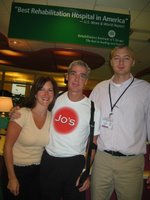How do I feel?

Bit from comic Stephen Wright (pictured to the left) describes it exactly: " You know when you're sitting on a chair and you lean back so you're just on two legs then you lean too far and you almost fall over but at the last second you catch yourself? I feel like that all the time."
My experience in recovery from physical injuries (six broken ankles and two snapped Achilles tendons) has taught me that the the most frustrating phase of the physical rehab process is that late phase in trying to move through the stages from 90% recovered to 95% recovered. The most frustrating challenge with stroke recovery for me , however, has been recognizing and dealing with the reality that while the stroke had significant impact on movement and coordination, stroke is a serious injury to the brain --it is essentially a brain attack. I've been fortunate to have received fantastic physical and cognitive therapy. Living through the stages of 90% to 95% recovery of cognitive functioning,howver, feels like almost falling over while leaning back on two legs of a chair -- all the time. I've adopted many techniques to help remember: glasses, wallet, cell phone, keys...But the slightest break from routine or distraction can push me into a state of confusion or panic that I've overlooked something important. Returning to the condo after asking cabbie to turn around five minutes from home to check to make sure I closed the garage door only to confirm that I did doesn't elicit a warm, comforting confidence that I'm on top of my game - especially when- try as hard as I might, I can't retrieve the memory of fetching the clicker from my backpack to close the garage door! You can only imagine how anxious these revelations make me around issues such as cooking and managing my many medications- and the ensuing concerns about balancing safety and desires for independence and a "care-free" approach to the day. So, I have systems like going through a mental checklist when leaving the house. I have specific pockets and pouches for vitals (wallet keys, glasses etc. I have medications sorted in plastic boxes by day of week and time of day- have leaned to place a dime in box of last dose taken to assure me that I took my latest dose vs forgot to fill and forgot to take a dose. When swimming laps in the pool, I use the visual cue of the depth marker 3'6" on the wall charting course towards the 3 on the odd laps the 6 on the even laps. And.. I've accepted the routine of getting tested every 3-6 months by neuro -psycholgist who administers two days of testing-- think IQ testing and SAT's rolled into one over two day period. This testing in combination with speech/cognitive therapy are both diagnostic and therapeutic and (as with the physical therapy), requires patience with the process and pace of recovering impaired function because it involves repeated failed attempts of a movement or thought process until the brain re-discovers and "memorizes"an electro-chemical pathway to successfully complete a task. Knowing that all this is happening in the background makes me feel less anxious about an occasional lapse of memory or attention helps to keep my focus on progress instead of the lack of perfection.


